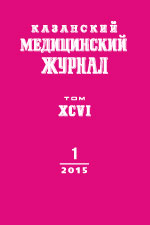Причины непрофильной обращаемости взрослого городского населения за скорой медицинской помощью
- Авторы: Пайков В.Л.1, Ишметов Р.П.1, Акчурина И.И.1
-
Учреждения:
- Станция скорой медицинской помощи, г. Казань
- Выпуск: Том 96, № 1 (2015)
- Страницы: 105-108
- Раздел: Организация здравоохранения
- Статья получена: 28.03.2016
- Статья опубликована: 15.02.2015
- URL: https://kazanmedjournal.ru/kazanmedj/article/view/1499
- DOI: https://doi.org/10.17750/KMJ2015-105
- ID: 1499
Цитировать
Полный текст
Аннотация
Цель. Изучить причины непрофильной обращаемости взрослого городского населения за скорой медицинской помощью.
Методы. Объектом для изучения были вызовы 1016 пациентов, из них 917 - в возрасте 18 лет и старше, обратившихся за скорой медицинской помощью с различными поводами с 1 января по 30 сентября 2014 г. с 8:00 до 20:00 в г. Казани и обслуженных первым автором. Причины непрофильной обращаемости за скорой медицинской помощью изучали путём разработки и внедрения нами анкеты с проведением опроса 298 больных в местах их проживания.
Результаты. Анализ карт вызовов показал, что преобладали результативные вызовы - 826 (90,1%) случаев, в том числе по неотложной помощи или непрофильной обращаемости - 457 (49,9%) случаев. Среди больных по непрофильной обращаемости за скорой помощью женщин было больше, чем мужчин, соответственно 277 (60,6%) и 180 (39,4%). При этом мужчины обращались преимущественно в возрасте до 60 лет (в среднем 56,6 года), а женщины независимо от возраста. По данным опроса, причинами обращений пациентов за скорой медицинской помощью были следующие: «далеко было добираться до поликлиники» (28 случаев, 9,4%), «не знали телефон поликлиники» (7 случаев, 2,3%), «чтобы своевременно получить помощь и врачебное назначение» (16 случаев, 5,4%), «симптомы заболевания и есть повод для обращения» (51 случай, 17,1%), «ухудшилось течение хронического заболевания» (34 случая, 11,4%), «не знали о необходимости обращения в поликлинику» (10 случаев, 3,8%), «выходной день» (17 случаев, 5,7%), «изначально знали об отказе в амбулаторной помощи» (23 случая, 7,7%), «иногородние» (11 случаев, 3,7%). Всё это в целом свидетельствовало о непросвещённости населения в вопросах места получения первичной медицинской помощи (66,1%). Кроме этого, ряд пациентов указали на то, что «нужно длительное время для того, чтобы получить талон к врачу» (25 случаев, 8,4%), «не дозвониться до поликлиники» (12 случаев, 4,0%), «не доверяют врачам поликлиник» (45 случаев, 15,1%), «не принимают вызов диспетчеры поликлиник» (11 случаев, 3,7%) и «проблематично попасть к врачу» (8 случаев, 2,7%). Впоследнем случае всё указывало на дефекты в работе территориальных поликлиник (33,9%).
Вывод. Причины непрофильной обращаемости взрослого городского населения за скорой медицинской помощью, по данным опроса, - санитарная непросвещённость в вопросах места получения первичной медицинской помощи (66,1%) и дефекты в работе территориальных поликлиник (33,9%).
Ключевые слова
Об авторах
Виталий Леонидович Пайков
Станция скорой медицинской помощи, г. Казань
Автор, ответственный за переписку.
Email: pvl05@rambler.ru
Ринат Петрович Ишметов
Станция скорой медицинской помощи, г. Казань
Email: pvl05@rambler.ru
Инна Ильдаровна Акчурина
Станция скорой медицинской помощи, г. Казань
Email: pvl05@rambler.ru
Список литературы
- Мирошниченко А.Г., Стожаров В.В., Барсукова И.М., Линец Ю.П. Скорая медицинская помощь в свете государственной программы развития здравоохранения Российской Федерации до 2020 года // Скорая мед. помощь. - 2013. - Т. 14, №2. - С. 4-9.
- Парфёнов В.Е., Мирошниченко А.Г., Барсукова И.М. Актуальные вопросы скорой медицинской помощи на современном этапе // Здоровье нации (Healthy Nation). - 2012. - №4 (11). - С. 16-19.
- Элькис И.С. К вопросу совершенствования работы участкового терапевта по оказанию неотложной помощи на догоспитальном этапе // Тер. архив. - 2007. - Т. 79, №1. - С. 13-14.
- Элькис И.С., Борисов В.А., Зубов С.П. Опыт преемственности работы станции скорой и неотложной помощи мегаполиса с поликлиниками и стационарами города // Скорая мед. помощь. - 2004. - Т.5, №1. - С. 8-11.
Дополнительные файлы







